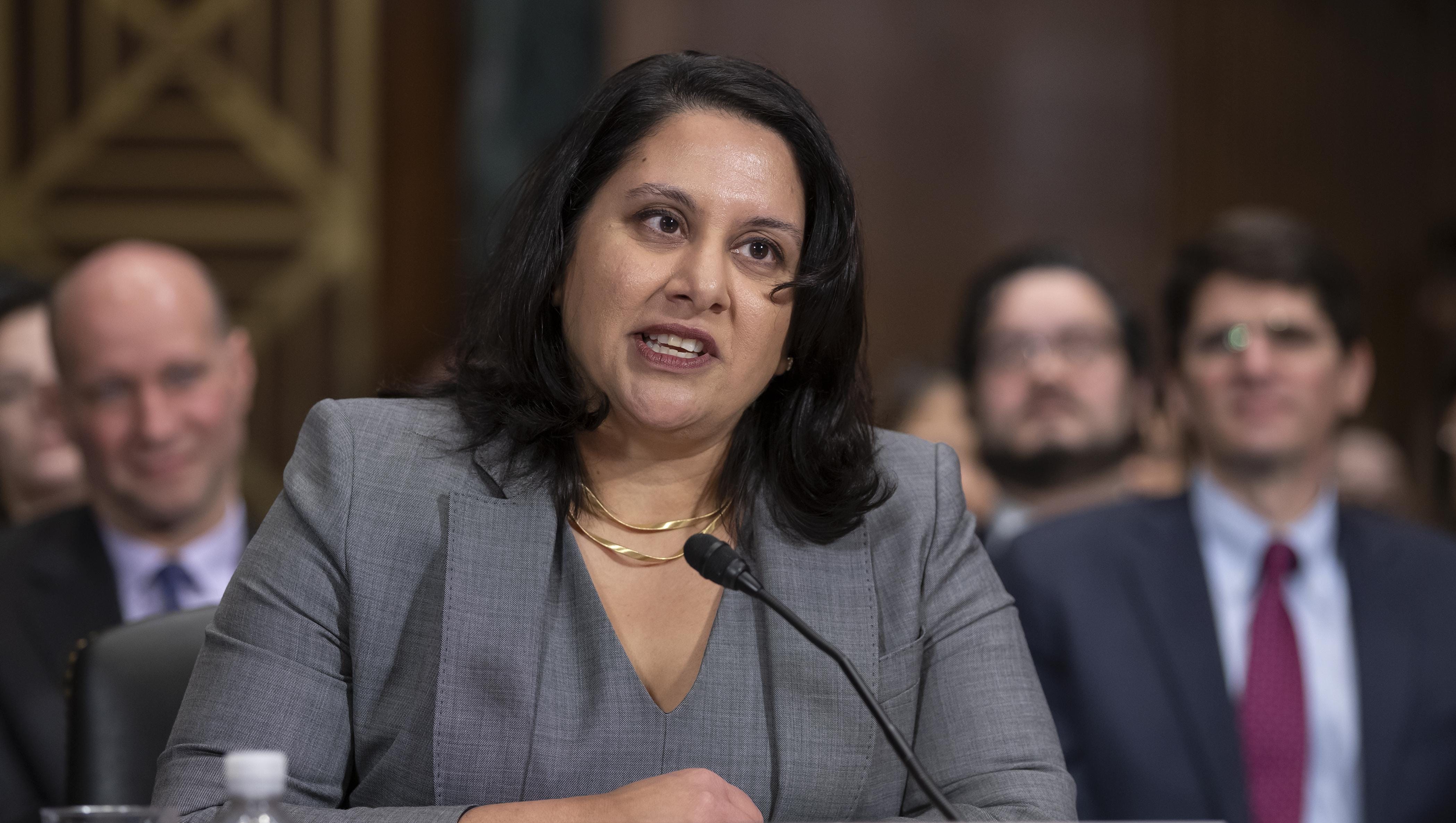Senate sends Michigan native Rao to federal bench
 Melissa Nann Burke
Melissa Nann Burke
Washington — The U.S. Senate voted Wednesday to confirm the controversial nomination of Michigan native Neomi Rao to serve on a powerful federal appeals court in Washington.
Rao, 45, becomes the first South Asian woman to serve on a federal appeals court, the U.S. Circuit Court of Appeals for the District of Columbia Circuit.
The vote broke down along party lines, 53-46, with Michigan Sens. Debbie Stabenow and Gary Peters and other Democrats opposing Rao's nomination.
President Donald Trump nominated Rao in November for the seat left vacant when Brett Kavanaugh last year joined the U.S. Supreme Court.
Considered an expert in administrative law, Rao oversees efforts to roll back regulations as Trump's regulatory czar and has reportedly been discussed as a potential future pick for the nation's high court.
She is on leave as a professor at George Mason University’s law school, where she taught for more than a decade.
Since her nomination, Senate Democrats have expressed concerns about Rao's views on executive power and climate change, her role in Trump's deregulatory agenda and articles that Rao wrote as a college student about sexual assault, gender equality and race.
Senate Majority Leader Mitch McConnell took to the Senate floor Wednesday calling Rao an "excellent choice" to serve as a federal judge.
"Her record includes a distinguished tenure in academia, public and private sector, legal experience, as well as a clerkship on the Supreme Court," said McConnell, R-Kentucky.
"Most importantly, in testimony before our colleagues on the Judiciary Committee, she demonstrated a commitment to maintaining the public trust and upholding the rule of law."
Rao was born in 1973 in Detroit to two physicians who immigrated from India the previous year.
She graduated from Detroit Country Day School and went on to Yale University and the University of Chicago Law School, later clerking for U.S. Supreme Court Justice Clarence Thomas.
A group of her contemporaries from law school, self-described as "progressives, independents and conservatives," wrote to the Judiciary Committee leaders to express their "enthusiastic support" of Rao's nomination.
"She has also earned our admiration for her open-mindedness, her thoughtfulness, her empathy, and her intellectual curiosity — all qualities conspicuously reflected not just in the care with which she examines all sides of a legal question, but in the warmth, respect and interest she showed each of her classmates," they wrote.
Senate Minority Leader Chuck Schumer criticized Rao this week for refusing to commit to recusing herself from any case involving regulations that she worked on while serving as administrator of the Office of Information and Regulatory Affairs for the Trump administration.
"As a nominee for the D.C. Circuit, which hears cases on federal regulation, Ms. Rao is hopelessly compromised," said Schumer, a New York Democrat.
"And that's to say nothing of Ms. Rao's alarming views. In past writings, she has expressed skepticism about climate change. She called sexual and racial oppression 'myths' and argued that independent federal agencies are unconstitutional."
Democrats haven't been the only ones to raise flags about Rao. Sen. Josh Hawley, R-Missouri, had expressed concerns last month about Rao's views on abortion, and her interpretation of the legal doctrine of “substantive due process."
Hawley subsequently met privately with Rao, whom he said assured him that she would interpret the Constitution based on its text and "not according to changing social and political understandings."
Sen. Joni Ernst, R-Iowa, along with several Democratic senators, scrutinized an article written about date rape when Rao was a student at Yale University suggesting that if a woman “drinks to the point where she can no longer choose, well, getting to that point was part of her choice.”
At her committee hearing last month, Rao said she looks back, and "I cringe at some of the language I used," saying that she'd since "matured as a thinker, writer and indeed as a person."
Rao also wrote to the committee on Feb. 11, saying she “lacked the perspective of how (her articles) might be perceived by others, particularly victims of sexual assault."
Ernst, who recently disclosed she was raped by her boyfriend in college, said what Rao wrote in college was "abhorrent and reprehensible at best," saying it sends the wrong message to young women.
Ernst ultimately voted to advance Rao's nomination in committee, but said if she were nominated for "another court at another time" — a reference to Rao as a Supreme Court contender — "my decisions and my vetting process and considerations may be very different."
Sen. Dianne Feinstein, the Judiciary Committee's ranking Democrat, was not convinced by Rao's apology, saying Rao's record "demonstrates that these views seem to persist to today."
Feinstein cited Rao's involvement in repealing protections for survivors of campus sexual assault, with her office approving controversial new rules announced last year under Title IX.
"It is safe to assume this change in the guidance will be challenged in the D.C. Circuit," Feinstein noted.
Stabenow of Lansing had said she would oppose Rao's lifetime appointment to the bench, raising similar concerns.
"When women are sharing their stories about assault and abuse, we don't need a judge who has written that if women have been drinking then they deserve to be assaulted," Stabenow said on the Senate floor recently.
"I join with colleagues in encouraging at the appropriate time a no vote on this nomination."
Peters of Bloomfield Township cited Rao's comments and writings on a "wide variety of issues" to explain his no vote.
"Some of them I don't even want to repeat," he said after Wednesday's vote. "I have felt pretty strongly that she should not be on the federal bench."
Sen. Mazie Hirono, D-Hawaii, said Wednesday she asked Rao at her hearing why, as a law professor, she had defended the practice of "dwarf tossing," which is when little people are thrown onto Velcro-covered walls or mattresses.
She called "bizarre" Rao's argument that a ban on dwarf tossing "coerces individuals to accept a societal view of dignity that negates the dignity of an individual's choice to be tossed."
"Does she seriously believe that dwarfs who are tossed do not share a societal view of dignity that being tossed is an affront to human dignity?" Hirono said in the Senate.
At her hearing, Rao said she was talking about a particular case in France and in the article was not taking a position on the issue of dwarf tossing.
The nonprofit organization Little People of America did not interpret her words that way, urging senators to block Rao's nomination over "this offensive view that she espouses."
mburke@detroitnews.com